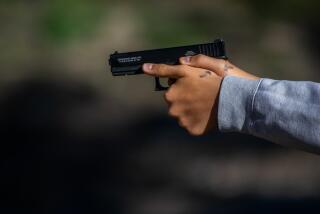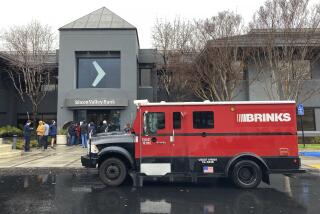.357 Magnum Pistol Tied to Pastor’s Son : Mark Owens Says He Had Sold Gun Found After Attempted Bombing
The high-powered revolver carried by Christian fundamentalist Eric Svelmoe last summer when he planted a pipe bomb at a San Diego abortion clinic was registered to Mark Owens, son of the Rev. Dorman Owens, imprisoned pastor of the Bible Missionary Fellowship in Santee.
Mark Owens said he purchased the .357-caliber Magnum pistol and later sold it to another church member, Jim Herrick. Herrick said he passed the gun to Svelmoe. Police found it in Svelmoe’s truck in July, when he was arrested after placing the bomb at the door of the Family Planning Associates Medical Group on Alvarado Road.
Neither Herrick nor Svelmoe changed the registration on the gun--which is voluntary under state law--and it remained under Mark Owens’ name.
The issue of the gun--and what bearing it may have on eight church members involved in the alleged conspiracy--has been one of the questions that federal and local investigators have been trying to answer in the attempted bombing case. Asst. U.S. Atty. Larry A. Burns said in a court hearing Wednesday that the investigation into the conspiracy is continuing.
Herrick and Mark Owens have not been charged in the case. Mark Owens has testified to the federal grand jury about his purchase of the gun and was considered “clean as a pin,” according to one law enforcement officer.
Herrick refused to discuss the alleged conspiracy with The Times, saying he had given his word to church elders that he would not.
But the subject of the gun dominated a prison conversation between Svelmoe and Dorman Owens--a conversation that was secretly recorded by the government and is being used as evidence to hold Owens on witness tampering charges.
During the first of two prison conversations, Dorman Owens seemed preoccupied about the subject and repeatedly asked Svelmoe whether the gun registration would result in an indictment of Mark Owens and what criminal penalties could be assessed on a gun charge.
He asked him whether the gun had been hidden under the seat and whether the gun was found empty. He said he believed authorities wanted to indict him and Mark Owens because of the origin of the gun.
Could Mean Nothing
One law enforcement source familiar with the attempted bombing said the multiple transfers of the .357 Magnum may be indicative of nothing more than how weapons are passed among some members of the conservative independent Baptist church.
Paul Owens, the eldest of Dorman’s three sons and now minister in charge of the Santee congregation, said Wednesday that there is a group of church “friends” who buy and trade guns. He said he owns firearms for hunting and protection.
“They get deals for each other, and they try to just make sure that they get the best buys that they can, those sort of things,” he said. “They go out and shoot together.”
Svelmoe was arrested after a high-speed chase from the clinic to El Cajon. By the time he was stopped, authorities said, Svelmoe had frantically removed armor-piercing bullets from the gun and tossed them into the back of his pickup truck.
Svelmoe is now cooperating with federal authorities in the government’s case against Dorman Owens and six other members of the congregation--all charged with conspiring to bomb the clinic.
On Monday, Svelmoe pleaded guilty to one count of attempting to “damage and destroy” the Alvarado Road clinic. Four other counts against him, including one of using a firearm during a crime of violence, were dismissed. Because he has already pleaded guilty and is no threat to flee, Svelmoe was released Monday night after he assured the court that he could post a $250,000 surety bond pending his appearance Jan. 25 for sentencing.
Dorman Owens has been charged with witness tampering stemming from the recorded visits with Svelmoe at the Metropolitan Correctional Center. He remains in the center without bail.
Mark Owens told The Times he purchased the gun in August, 1986, and sold it to Herrick in December of that year after Herrick approached him about buying a handgun for home protection.
Was Contacted at Church
“He contacted me at church,” Mark Owens said. “That was the very last I knew of the gun. In fact, I was pretty upset at Jim when he didn’t tell me that he had sold it to Eric Svelmoe.”
Mark Owens said he sold the Sturm Ruger revolver to Herrick for $300--the same price he originally paid to a gun dealer. He said it was the “surprise of all surprises” when he found out after Svelmoe’s arrest that the gun confiscated by police was the same gun.
Mark Owens said he doesn’t believe Herrick bought the gun with the express intention of supplying it to Svelmoe.
“If you’re trying to construe that he might have purchased this to give to Svelmoe, I have a hard time believing that,” he said.
“I don’t usually buy guns to sell them,” said Mark Owens, who described himself as a gun collector. “I buy guns to keep them. In this case, I had no use of it.”
Under California law, only the original purchaser of a gun must register the weapon. If it is resold, reregistration is strictly voluntary, said an official with the state’s Department of Justice.
A law enforcement source said Svelmoe told investigators he originally obtained the gun from Herrick for protection because of a rash of burglaries in the trailer court where he was living.
Svelmoe also told investigators he obtained armor-piercing bullets because he became concerned that standard ammunition fired inside the trailer home would cause more damage to the walls, the source said. A week before the attempted bombing, Svelmoe purchased the bullets and then forgot he had left the gun in his truck, where it was found by the police, Svelmoe told investigators.
Weapon Discussed in Prison
Dorman Owens and Svelmoe discussed the discovery of the gun during a Nov. 2 conversation in prison.
According to the tapes, Dorman Owens told Svelmoe that, because of the gun, authorities were “trying to get Mark involved in this thing.”
“One thing,” Dorman Owens said, “it would be very difficult for the church to go through a year of battle in court and dragging people in from every direction.
“In fact,” the pastor added, “one lawyer came back and said they were going to indict Mark and then the lawyer said it was definite they were going to indict me and Mark. They were pointing at Mark just because he owned the gun that you were carrying. And that they were definitely going to do that, see?
“And it really kind of scared Mark up, you know. He didn’t have the least idea about what was going on. Except he sold . . . “
” . . . He sold Jim Herrick the gun,” Svelmoe interjected, “and he (Mark Owens) didn’t even know I had the gun?”
“Yeah, right,” Dorman Owens said. “He sold Jim Herrick the gun and you got it from Jim.”
Dorman Owens also asked whether the bullets were found in the back of the truck, and Svelmoe said they were. Dorman Owens asked whether the gun was found hidden under the seat, and Svelmoe said it was.
“The fact it was left behind, that isn’t a motive to hire anybody or to use a weapon in any way?” Dorman Owens asked Svelmoe.
“That’s true,” Svelmoe answered. “They couldn’t prove a motive. But they don’t have to. If you have it, or on your person, and you even have no intent of using it, you’re guilty (of using a gun during the commission of a felony).”
During the conversation, Dorman Owens asked Svelmoe: “Do you think the gun charge will hold up?”
Svelmoe told Dorman Owens that the authorities would be reluctant to drop the gun possession charge, which he said carried a mandatory five-year prison term. However, the gun charge was dropped in return for the guilty plea on another count in the indictment.
Svelmoe Was a ‘Brother’
Herrick also visited Svelmoe at the corrections center. The Santee construction worker said he visited Svelmoe because Svelmoe was a “brother.”
Herrick said that during the first days of Svelmoe’s incarceration, Herrick took in Svelmoe’s wife and daughters while they were looking for new housing.
Herrick refused to discuss the alleged conspiracy that led to the bombing attempt by Svelmoe. He said he was bound by an “agreement” made with church elders three weeks ago not to discuss the matter with anyone.
He also said he was no longer a member of the Bible Missionary Fellowship, but he declined to say what led to his departure from the tight-knit group less than a month ago.
On Wednesday, Paul Owens acknowledged that he and other church leaders asked Herrick to keep silent about Svelmoe and details of the case.
“We’ve asked everybody not to talk about the case, basically, because it is basically non-productive,” Paul Owens said, adding that he and other church leaders excommunicated Herrick for making “malicious” statements aimed at sowing discord among the congregation.
“You could more or less say it was for making statements about Svelmoe that would be inflammatory,” Paul Owens said. “In other words, designed to cause people to side with Eric against the church. ‘Poor Eric’ type of statements.”
Also on Wednesday, a federal judge on denied a motion by Dorman Owens’ attorney to release Owens from prison just long enough to confer with his attorney.
The attorney, Thomas Warwick, made the request because he said Owens is reluctant to talk about the case in the visiting rooms in prison because the government secretly recorded Dorman Owens and Svelmoe in the rooms last month.
Logistics Mentioned
U.S. Dist. Judge Earl B. Gilliam denied the request, citing the logistical problems that would be encountered by the U.S. marshal’s office to guard Dorman Owens during periodic releases.
Though there is a video camera in the correctional center’s visiting rooms for security, it is not equipped with microphones, and a standing court order prohibits the government from secretly taping attorney-client conversations, Gilliam added.
The earlier taping was done with Svelmoe’s cooperation, and at the time Dorman Owens had not been charged with a crime.
After Wednesday’s hearing, Burns, the prosecutor, said that releasing Dorman Owens from prison for periodic visits to his attorney’s office posed problems for the marshal’s office. Burns said it would take at least seven marshal’s deputies to guard the preacher.
The marshal’s office also objected to the court assigning definitive times when Owens could be released from and returned to prison.
More to Read
Sign up for Essential California
The most important California stories and recommendations in your inbox every morning.
You may occasionally receive promotional content from the Los Angeles Times.










